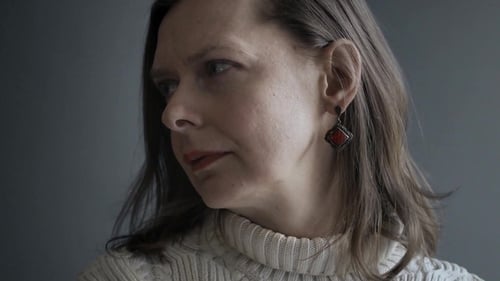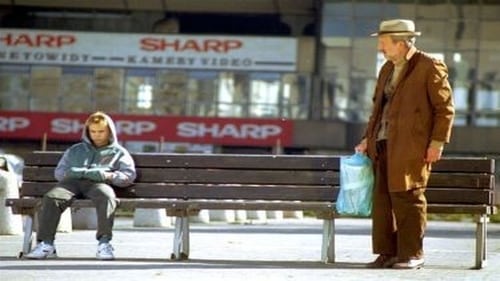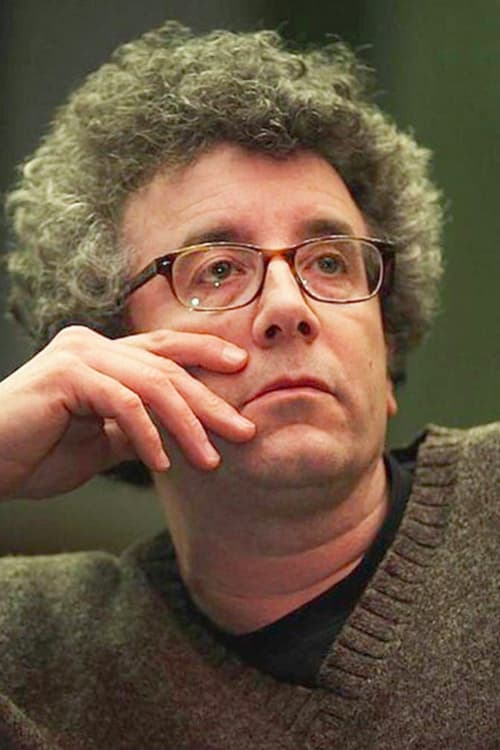Paweł Łoziński
Nascimento : 1965-12-04, Warsaw, Poland
História
Son of documentary filmmaker Marcel Lozinski, Paweł Łoziński was born on December 4, 1965 in Warsaw, Mazowieckie, Poland. He is a director and writer, known for "Film balkonowy" (2021), "Chemia" (2009) and "Siostry" (1999).

Sound Mixer
Composed from the conversations that the director holds with people passing by in the street under his Warsaw apartment, each story in 'The Balcony Movie' is unique and deals with the way we try to cope with life as individuals. All together, they create a self-portrait of contemporary human life, and the passers-by present a composite picture of today's world.

Editor
Composed from the conversations that the director holds with people passing by in the street under his Warsaw apartment, each story in 'The Balcony Movie' is unique and deals with the way we try to cope with life as individuals. All together, they create a self-portrait of contemporary human life, and the passers-by present a composite picture of today's world.

Producer
Composed from the conversations that the director holds with people passing by in the street under his Warsaw apartment, each story in 'The Balcony Movie' is unique and deals with the way we try to cope with life as individuals. All together, they create a self-portrait of contemporary human life, and the passers-by present a composite picture of today's world.

Writer
Composed from the conversations that the director holds with people passing by in the street under his Warsaw apartment, each story in 'The Balcony Movie' is unique and deals with the way we try to cope with life as individuals. All together, they create a self-portrait of contemporary human life, and the passers-by present a composite picture of today's world.

Director
Composed from the conversations that the director holds with people passing by in the street under his Warsaw apartment, each story in 'The Balcony Movie' is unique and deals with the way we try to cope with life as individuals. All together, they create a self-portrait of contemporary human life, and the passers-by present a composite picture of today's world.

Director
The passage of time during the pandemic has grown to become my character. The world froze, together with the camera on my balcony. I’m watching a shard of the world in a frame and a unique slice of time we have all found ourselves in. I listen intently to abrupt silence. But life that has slowed down continues under my balcony. New characters are moving along like on the stage. I’m asking people questions I cannot answer myself - what will come next?

Screenplay
Relationships with the people you love most are often the most complicated. This is the problem Hania and her mother Ewa face during their sessions with a psychotherapist, filmed intimately and with the utmost respect by director Paweł Łoziński. The camera always focuses on one person at a time, revealing every emotion hidden behind the words and silences. The empathetic therapist carefully but purposefully peels away the hard layers under which mother and daughter shield themselves. Little by little, the personal tragedies that hamper their communication rise to the surface, as well as the source of the longing for love and acknowledgement that they find so hard to fulfill.

Director
Relationships with the people you love most are often the most complicated. This is the problem Hania and her mother Ewa face during their sessions with a psychotherapist, filmed intimately and with the utmost respect by director Paweł Łoziński. The camera always focuses on one person at a time, revealing every emotion hidden behind the words and silences. The empathetic therapist carefully but purposefully peels away the hard layers under which mother and daughter shield themselves. Little by little, the personal tragedies that hamper their communication rise to the surface, as well as the source of the longing for love and acknowledgement that they find so hard to fulfill.

Producer
What are the limits of personal sacrifice? The film tells the story of a match factory worker who takes up a remarkable challenge. We observe several crucial months in her life as she attempts to turn her dreams into reality. It’s the story of an extraordinary transformation, and about a love that gives her life meaning.

Cinematography
What are the limits of personal sacrifice? The film tells the story of a match factory worker who takes up a remarkable challenge. We observe several crucial months in her life as she attempts to turn her dreams into reality. It’s the story of an extraordinary transformation, and about a love that gives her life meaning.

Director
What are the limits of personal sacrifice? The film tells the story of a match factory worker who takes up a remarkable challenge. We observe several crucial months in her life as she attempts to turn her dreams into reality. It’s the story of an extraordinary transformation, and about a love that gives her life meaning.

Writer
Two acclaimed documentary film-makers - father and son - drive from Poland to Paris to see the place where the ashes of the father's mother are buried. What accompanies them on the way are resentments, quarrels and sincere confessions.

Director
Two acclaimed documentary film-makers - father and son - drive from Poland to Paris to see the place where the ashes of the father's mother are buried. What accompanies them on the way are resentments, quarrels and sincere confessions.

Writer
Father and Son on a Journey

Self
Father and Son on a Journey

Director
Paweł Łoziński’s documentary is a short, metaphoric story, undertaking a problem of memory, identity, searching for traces of the recent past. Here, on thirty hectares in the city centre, the inventory is being made – it is to lead to reconstruction of a lost city. The camera focuses on details, showing fingers touching an obliterated inscription or a laborious process of decoding letters excavated from the ground, because each of them means something.

Director
Pawel Lozinski follows the chemotherapy patients of a cancer ward over a year. The outside, where ‘normal’ life continues, trees bloom, shed their leaves or are covered with snow, does not exist except in a few glances out of the window or at some dim passing figures. The camera consistently focuses on dialogues and on the faces of those who find themselves between life and death and their closest relatives, capturing this suspended life with wonderful ease.

Director
There are elegant ladies as well as poor pensioners among them. Burdened with shopping bags, day and night, regardless of the weather and time of the year, they visit parks, cemeteries and secluded places. These are ‘cat ladies’, considered as weirdos by some and angels of good by others. Maybe these women feeding homeless cats are trying to fill an empty space in their lives or satisfy their maternal instincts. Before the camera they philosophize, sing old songs and tell stories of love, fear and lost opportunities. One character argues with her husband with whom she shares nothing but a love of cats. They all speak of their pets with fondness and affection and have a name for each of them. Łoziński has managed to paint a portrait of women who have found an aim at the end of their lives.

Director
Poles forcibly displaced from the eastern lands after 1945 tell about their experiences, recall that difficult period when they had to leave their homes, leave all their possessions, neighbors. Paweł łoziński's Film is a story about people who had to start life from scratch in a new place. They can hardly hide their emotion, hold back tears. They're trying to make a whole out of memory chips.

Director
For Paweł łoziński, the population census becomes an excuse to show a fragment of the Polish countryside. The camera's filling in for the census clerk. We visited several farms in one of the small villages. We ask questions that are not in the census form, about the meaning of life, dreams, needs.

Director
A story of a Ukrainian gastarbeiter that comes to the director flat to clean windows, irons and cooks.

Director
Paweł Łoziński films his own neighbours, the drunk but charming Wiesio, his long suffering partner Mrs. Ania and a retired barber, Mr. Zdzislaw, who misses his late wife dearly. The film follows their daily lives and examines poverty, loneliness and death.

Director
The Polish entry in the BFI’s Century of Cinema series of documentaries

Writer
Two old sisters, living in the same Warsaw apartment, sit on a bench and talk. The 87-year-old elder one seems to care for the other reluctantly and treat her badly. The younger, who is said to be clumsier, has walking problems.

Director
Two old sisters, living in the same Warsaw apartment, sit on a bench and talk. The 87-year-old elder one seems to care for the other reluctantly and treat her badly. The younger, who is said to be clumsier, has walking problems.

Director
Tsuneo Okazaki, a Japanese man who has lived in Poland for nearly 30 years, invites you to an extraordinary journey through his homeland. In the six-part documentary series, he will talk about various aspects of life in modern Japan, such as: tradition, family life, education, industry, agriculture and ecology.

Director
Writer Slawomir Mrozek recalls his past as he prepares himself to move out from Mexico and resettle in his native Poland. He discusses his youth, career and emigration, while walking down his vast Mexican ranch La Epifania.

Writer
The film was made according to the idea and under the care of Krzysztof Kieślowski. A contemporary story about 10-year-old Sebastian and Eugene, a retired elevator man. Despite the age difference between them, they are struggling with a similar life situation - they are lonely, with no support in the family, forced to fight for survival, in a world that does not care about them. The fate of the characters is linked by a desire to get a 500-franc note, lost by a French pianist. The money fell into a deep sewage grid, from which it is not easy to take it out. They start a war with each other, use deceit, sometimes join forces to try to get the banknote on their own. With time, they become more and more exposed to each other.

Director
The film was made according to the idea and under the care of Krzysztof Kieślowski. A contemporary story about 10-year-old Sebastian and Eugene, a retired elevator man. Despite the age difference between them, they are struggling with a similar life situation - they are lonely, with no support in the family, forced to fight for survival, in a world that does not care about them. The fate of the characters is linked by a desire to get a 500-franc note, lost by a French pianist. The money fell into a deep sewage grid, from which it is not easy to take it out. They start a war with each other, use deceit, sometimes join forces to try to get the banknote on their own. With time, they become more and more exposed to each other.

Assistant Director
Karol, um cabeleiro polaco e Dominique, a sua esposa, mudam-se para Paris. O casamento desmorona-se e divorciam-se. Karol perde tudo após o divórcio e torna-se num mendigo, recusando actos ilícitos para ganhar dinheiro. Após conseguir finalmente regressar ao seu país, tenta refazer a sua vida, embora nunca tenha esquecido Dominique.

Writer
Henryk Greenberg is a Polish-born American who lost much of his family in the Holocaust. Certain of the location where his father and younger brother were murdered, Greenberg returns to find most of his former neighbors predictably claiming foggy memories at first; but soon their recollections come more easily.

Director
Henryk Greenberg is a Polish-born American who lost much of his family in the Holocaust. Certain of the location where his father and younger brother were murdered, Greenberg returns to find most of his former neighbors predictably claiming foggy memories at first; but soon their recollections come more easily.

Director
An experienced prison guard, who also gives talks at a primary school, shares his thoughts on such topics as upbringing, order, young people, freedom and Solidarity.




